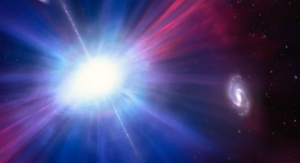It feels like every time astronomers get a handle on a cosmic phenomenon, a new one pops up that sends them back to the drawing board. Case in point – Hubble has spotted a strange burst of light in a region of space where there didn’t seem to be a trigger.
A few years ago, astronomers officially described a new type of explosion in space – Luminous Fast Blue Optical Transients (LFBOTs), or just FBOTs. That name is pretty descriptive of what they are – very bright flashes of light in the optical part of the spectrum, that tend to shine brightly at blue wavelengths before fading in a matter of days.
Crazy things the ancient Romans did (video)
Only a few examples of LFBOTs have been identified in data going back to 2016, but from their common characteristics astronomers had started to pull together a list of hypotheses about their origin. The leading candidate was a rare event called a core-collapse supernova, which occurs when a giant star exhausts its fuel supply and explodes under its own gravity.
Continue here: New Atlas
Ask me anything
Explore related questions




